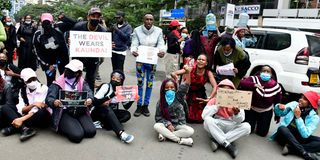
Protesters on Kimathi Street, Nairobi, during day 03 of the Occupy Parliament Protest on June 20, 2024.
5.20 on Tuesday. A huge cloud of white smoke laced with pepper has filled the air at Nairobi’s Central Police Station and its environs.
The police have just fired a teargas canister at the Law Society of Kenya (LSK) president, Faith Odhiambo, and her council members, who have come to release about 300 young people.

A woman shouts slogans near Parliament in Nairobi on June18, 20244 during a protest against Financial Bill 2024.
Oblivious to the discussions for their release outside the dimly lit, bedbug-infested police cells, the young men and women in their 20s, some bruised from being manhandled and teargassed, chanted, “Ametuzoea, ametuzoea, huyu Ruto ametuzoea. Hatutakubalii, hatutakubalii, huyu Ruto, hatutakubalii.”
They had been locked up for protesting over the 2024 Finance Bill, a revolution that started on social media and spread to the streets.
Anita, 17

Content creator and activist Anita Barasa during the Anti-Finance Bill demonstrations on June 20, 2024 on Kimathi Street in Nairobi.
So how did Generation Z, or GenZs, a group born between 1997 and 2012, come to stand up to President William Ruto’s government?
On TikTok, Instagram, and X (formerly Twitter), it all started with posts about how the new taxes would affect their future and the perceived misuse of public funds at a time when the government was preaching austerity.
Besides the Finance Bill, they lamented about the high university fees following the government funding review, the taxes on digital content, an industry that currently employs thousands of them, and the lack of quality services in hospitals. They also objected to the allocation of funds to the spouses of politicians.
Among those who used her social media platform to call GenZ to protest was Anita Barasa, 17.
Popularly known on TikTok as ‘Anini’, she shared a video that went viral. The 17-year-old’s message may have been directed to her 60,000 TikTok followers, but her call to action to fellow Gen Zs on why they needed to go to the streets and reject the 2024 Finance Bill spread across the social media platforms.
“There is nothing good about this morning; all of you have to show up outside Parliament because, according to Article 37 of the Kenyan Constitution, we have the right to protest,” she said.
“Do you remember a majority of Gen Zs did not show up to vote? It is why we are in this mess, as Bill is going to make life unbearable for you too,” Anita told her audience, using the diction and delivery that her agemates understand better.

Youths protest on Tom Mboya Street in Nairobi during the third day of anti-tax protests on June 20, 2024.
Young people around Kenya facing economic frustrations joined the #RejectFinanceBill2024 protest. By noon on Tuesday, hundreds thronged the streets of Kenya’s capital, Nairobi, chanting ‘Ruto must go’ and singing ‘Yote yawezekana bila Ruto’.
By Wednesday, the Gen Zs living in Mombasa had joined the Finance Bill street protests. On Thursday, they were back on the streets and had influenced more of their peers to demonstrate, and this time across the country: in Nyeri, Eldoret, Kisumu, Kisii, Kitale, and other places.
New protestor
Wearing ripped jeans, cargo pants, designer tracksuits or belly-bottom trousers, their hair twisted in dreadlocks or sister-locks or braided with fiery red butt-long braids, eyes covered with goggles, designer sneakers, face masks, and hats covering the hijabs for the Muslims, they engaged the police in running battles.
They chanted, “nye nye nye hatutaki nye nye nye’, lyrics from “Fimbo ya Pili” song. They hit back the teargas canisters at the policemen as they would on the tennis courts.
The profile of the Kenyan protestor had changed. They are young, sophisticated and mostly female. No political ambitions, at least for now. A handful are female Muslims, something not seen in older generations due to religious and cultural restrictions.
The new-generation protestors also have decorum. Along Nairobi’s Kimathi Street on Thursday, cars remained parked safely. The demonstrators did not loot, break, or destroy property. Some had their mobile phones in their back pockets, as they would when hanging out with friends. The only weapon Gen Zs carried to the protests was a smartphone.

A young lady is arrested by police officers at the National Archives for taking part in anti-tax protests on June 20, 2024.
Gen Z numbers
Kenya has about 18.4 million GenZs or about 33.42 percent of the population. They also represent the biggest percentage of unemployed Kenyans, yet perhaps the most educated group.
Data from the Kenya National Bureau of Statistics shows that unemployment is highest among these 20- to 24-year-olds at 15.6 percent, followed by the age group of 25 to 29 years old, who represent 5.9 percent of the jobless Kenyans.
Many of them are tech-savvy, have been born in the internet era, and are energetic and fearless. They have no qualms questioning the most powerful, be it in offices, at home, or in government. On Thursday alone, they engaged the police in a seven-hour cat-and-mouse theatric.
I ask Anita if she is fearful of retaliation from the government.
“I only fear God,” she says. “Even if someone comes here now [pointing at her shoes], I only fear God.”
From their mobile phones, they earn a living, and from them, they are using them as tools of revolution. Anita makes money with her mobile phone.
“I am a content creator and activist,” she says. “What we Gen Zs have done using TikTok is massive, and I am so grateful for that. However, I work with brands, and sometimes I make Sh150,000 from TikTok.” Anita believes in using social media for good.
“TikTok to me is a platform to empower people,” she says. “President Ruto wants to tax content creators for content that we create on platforms that his government does not own; that was my turning point because, when I saw it, I was like, Now we just have to go out there and fight.”

Protesters take part in anti-tax demonstrations in Nairobi on June 20, 2024.
She is talking about plans to expand the coverage of digital content monetisation works for income tax purposes to include creative works and creating or sharing content.
The 17-year-old, who believes an apple never falls far away from the tree, says her activism stems from her father.
;“My dad is a big activist, he was about to come and join me, but it’s just that he’s 60. He studied in Russia and led protests in 1984, as black students were at the time racially abused and discriminated against. I told my mom about the protest, and she was like, ‘As you go to protest, stay safe and make sure you fight for your rights because your future is in your hands,” she told Lifestyle.
Coordination
The leaderless Gen Z protest had enviable coordination. There was a team of volunteers paying fares for those coming into the city centre with matatus. Another taught their peers, on social media, how to dress appropriately for the protests, being first-timers.
There was a medical team taking care of the injured. A generation that is adept at technology possesses strong multitasking skills, and can easily bypass multi-factor authentication, there was a group doing social engineering, also known as phishing, and was able to send a mass of text messages to politicians not to vote “Yes” to the Finance Bill.
A night before the protests, they taught each other how to have virtual private networks (VPNs) on their mobile phones to bypass Internet restrictions, just in case. They brainstormed on how to turn their smartphones into walkie-talkies using an app called Zello.
On the streets, they protected themselves by circling the police cars as the policemen prepared to dislodge teargas, chanting “we are peaceful”.
In most instances, the police retracted, although for a few minutes, before throwing more tear gas canisters. As the teargas exploded in the air, one young man carrying a water bottle on his head, distributed it to fellow protesters to wash off their faces.
“We love these children,” said a middle-aged woman following the protests through the window.
On Thursday at 11am, one could hardly find an empty table at Java, a popular coffee restaurant on Nairobi’s Kimathi Street. Between sips of coffee, the mostly young patrons conversed animatedly, occasionally walking to the windows to check the activity building up outside. That was until the first tear gas canister was fired. A young woman in her early 20s, wearing a face mask, sprang to her feet and asked for everyone’s attention.
“The cops have arrived, let’s go guys. Remember to always keep together. The politicians have failed us, haven’t they? They think we are fools,” she said, signalling her colleagues.
Just show up
Contrary to popular belief, Anita says they did not sit down and plan to protest, all she and the rest of GenZ did was to ask their peers to show up on the streets.
“I just took my phone and made the video you saw urging people to show up and then there was a spillover to other platforms because someone from Twitter (X) shared the video there then a guy called Boniface [Mwangi, a long-term activist] made a poster, and since everyone is tired and frustrated by the government, they all cooperated,” she narrates, adding that she does not understand how Millennials, Baby Boomers and Gen X sat and watched for all these years as the price of a loaf of bread rose from Sh5 to Sh65.
“The older generation is made up of cowards who have been hiding behind Raila Odinga, Okiya Omtatah, Boniface Mwangi and the late Wangari Maathai. This is why we have decided to join hands as Gen Zs and fight the system ourselves,” Anita says while urging the older generations to “wake up and realise that they have a voice and a constitutional right to be heard.”
This resolve is what drove Anita to wake up at 6am to make it to town for the protests.
“I live far, I had to wake up early so that I arrive in town before everyone else with the banners, and placards I had made, as well as the whistles. We had a ‘protest starter pack’ which included black clothes to signify death because the high taxes are killing Kenyans and if that Bill is passed we will not be here for real,” she says.
The starter pack also contains water bottles, a whistle, tights for women or biker shorts, sneakers or canvas as their male counterparts wear shorts or jeans.
Lifestyle sought to know from Anita what Gen Zs will do in the event the Bill passes, and she replied, “Knowing the calibre of MPs we have, it will pass, that I know. That does not in any way mean that we are protesting for nothing. As Gen Zs, our concerns have been heard, and for the first time the world has stopped to listen to us which is a good thing.” “We are very much aware that there is a July 1 deadline and know the country cannot run without a budget but it would make me happier if our MPs and President William Ruto choose to listen to us.”
Zaha, 23
Zaha Indimuli, 23, is another protestor who “ may be young but not timid”.
“We are young people, but we are not scared, we are many, we are not moved and this is only the beginning of a revolution,” she tells Lifestyle.
She too says they used TikTok to mobilise people to the streets.
“Some of us even practised our ‘maandamano’ songs the previous night. We were ready. But when we got here we were beaten by police, brutally assaulted, harassed and teargas canisters lobbed on us,” she says.
She agrees with Anita that the older generation has failed them.
“They are a disappointment, we have been looking up to them as parents but if our parents keep voting in bad governance and sit quiet year-in-year-out as bad leaders germinate and grow in stature and power, it’s upon us Gen Zs to build a new generation of people that can call out bad governance, show up and not be scared,” she told Lifestyle while reminding that even the teargas canisters that were being lobbed at protesters were bought with taxpayers’ money.
According to Zaha, Gen-Zs understand that if they have the power to vote in leaders they also have the power to vote out bad governance.
“It is our duty to send bad leaders home, that is why we are mobilising and 2027 will be here soon. I’m 23 and I know this for a fact, the older generation has a fear that makes them not know their power which is why they are silent as Kenyans suffer,” she says.
Her source of annoyance is Kenya’s growing debt burden and the punitive taxes which she says Gen Zs will have to bear after the older generation, which politicians belong to, is dead and gone.
“Some of our parents are police officers, they are so cruel to us and brutally beat us for being in the streets, forgetting that we are also protesting for them because they are slaves of a rotten system and bad governance,” Zaha says, adding, “this is a warning shot that Gen-Zs are rising, have the numbers and they are coming.”
Abdul, 20
One thing about this new protester is, male, has no shame in talking about what was perceived as women’s issues. African men have shied away from fighting for menstrual rights but to Abdul Godana, a 20-year-old, this is not a taboo topic.
He says he hails from Isiolo South and went to the streets because they were tired of being in the shadows when their respective Members of Parliament (MPs) were not prioritising their interests.
He says if the Finance Bill 2024 is passed, it will cripple many things that Gen Zs have been doing.
“Kenya has hit rock-bottom to a point that there is no more ‘bottom’. Our hospitals have no drugs, I have a close relative who is battling cancer and cannot afford chemotherapy treatment, while at the same time, my sisters will not afford sanitary towels with the proposed taxes that I have read in that Bill. This is why I have joined fellow young people in the streets today,” he told Lifestyle.
“I come from an Asal [arid and semi-arid region with a high poverty rate], I know what hardship is and if President Ruto subjects us to punitive taxes to add on the million and one problems we are grappling with, we won’t breathe,” he says.
He says he is more than determined to go back to the streets as many times as he will need to ensure that the Finance Bill 2024 does not see the light of day. By Thursday 6.05pm, the Bill had sailed through the Second Reading in Parliament, with 204 MPs approving it and 115 rejecting it. On the streets, the protests continued as darkness set in. More teargas canisters exploded in the air.
“This is a TikTok revolution, you know, many people have been assuming that GenZs will only complain on social media, and then it ends there the way the older generation does because they fear the government,” he says.
“Well, the fear is gone, especially because content creators dissected the Bill and told us that it is a threat to national security, which is why we must rise against it, watch us turn things topsy-turvy because Gen Zs mean business,” Abdul said.
‘Maziwa ya Nyayo’
To many older people, the GenZ revolution has come as a shocker. One wonders about their boldness, especially as the Generation Alpha, babies born just less than 10 years ago, joined the TikTok revolution, addressing Mr Ruto, and questioning bad governance and punitive taxes.
Jennifer Kaberi, a child development expert at Mtoto News reminds us that the younger generations did not drink ‘maziwa ya nyayo’ [ meaning they did not grow up in the late President Daniel Arap Moi era].
“They do not know the fear that comes with being ruled by an authoritarian regime. The first lot of Gen Zs were born when President Mwai Kibaki was in power. He was an easy guy who never really took to heart what people said about him, then came President Uhuru Kenyatta who during his tenure was very friendly, interacted with young people a lot and embraced them, which is why they totally have no fear,” she explains.
The child development expert also reminds us that Gen Zs are a generation that witnessed Kenyans butchering each other in 2007 when post-election violence erupted. They felt hopeless because they then, were children who did not have a national ID to have voted, so they were bearing the brunt of the adults.
“Gen Zs experienced trauma, they saw people being killed live on TV, they saw their parents, who are supposed to protect them, living in fear and not knowing what’s going to happen next,” Ms Kaberi says, adding that because they were children at the time they did not know what to do and felt helpless.
Ms Kaberi adds that Gen Zs were shocked that the older generation was watching the loss of lives and injustice go on, these stuck with them because no one went back to provide counselling and therapy.
And now they are adults and feel or know they can do something to change their country.
Researchers at Stanford University’s Centre for Advanced Study of the Behavioural Sciences noted that college-age members of Gen Z know they are confronting a future of big challenges—not just whether they can find jobs or own homes, but how they will handle climate change, artificial intelligence, genetic engineering, 3-D-printed guns, and pandemic illnesses—and, depending on the person, are afraid, resigned, or energised.
Ms Kaberi highlights a social media post one of the young people made during the protests, which says, ‘Ruto should know we are the ones who were striking and burning schools, asituletee, we caused reforms in Education and we are doing the same to this country’.

A man kicks a tear gas canister in Nairobi on June 18, 2024 during a protest against the Finance Bill, 2024
Who radicalised them?
“So before accusing them of being radicalised, ask yourself who radicalised them. We did, by accepting impunity and they consider us to be ‘useless and cowards’ because we did not protect them by standing up for the country,” Ms Kaberi said, adding that in the mind of Gen Zs, they believe they need to do something to undo or right the wrongs the older generation did.
In a recent peer-reviewed study published by Sage, a global journal titled ‘The Millennial/Gen Z Leftists Are Emerging’, sociologists disclose that they are being challenged by a new wave of scholars who are of the view that millennial/Gen Zs are the most progressive generation since the 1960s.
Ms Kaberi agrees with them.
“In Kenya, unlike the older generation, as Gen Zs grew up we started teaching them child rights in Class One, we included it in their syllabus because the Children’s Act came into play in 2001, and so they learnt that they have power and are not like us,” she said.
The child development expert points out that in August 2010 when Kenya promulgated the new Constitution, Gen Zs were very much around and were conversant with what was happening because they read the Constitution when they were in school and understood it.
They also consume media like TV and radio where a lot of civic education was done on the then-new Constitution. Therefore, they understand their rights.
“Gen Zs are expressing themselves because they have seen adults do it.
They are however much more intentional, very well organised, united and have built a robust TikTok community which makes them a very powerful force that cannot be ignored,” she said.










